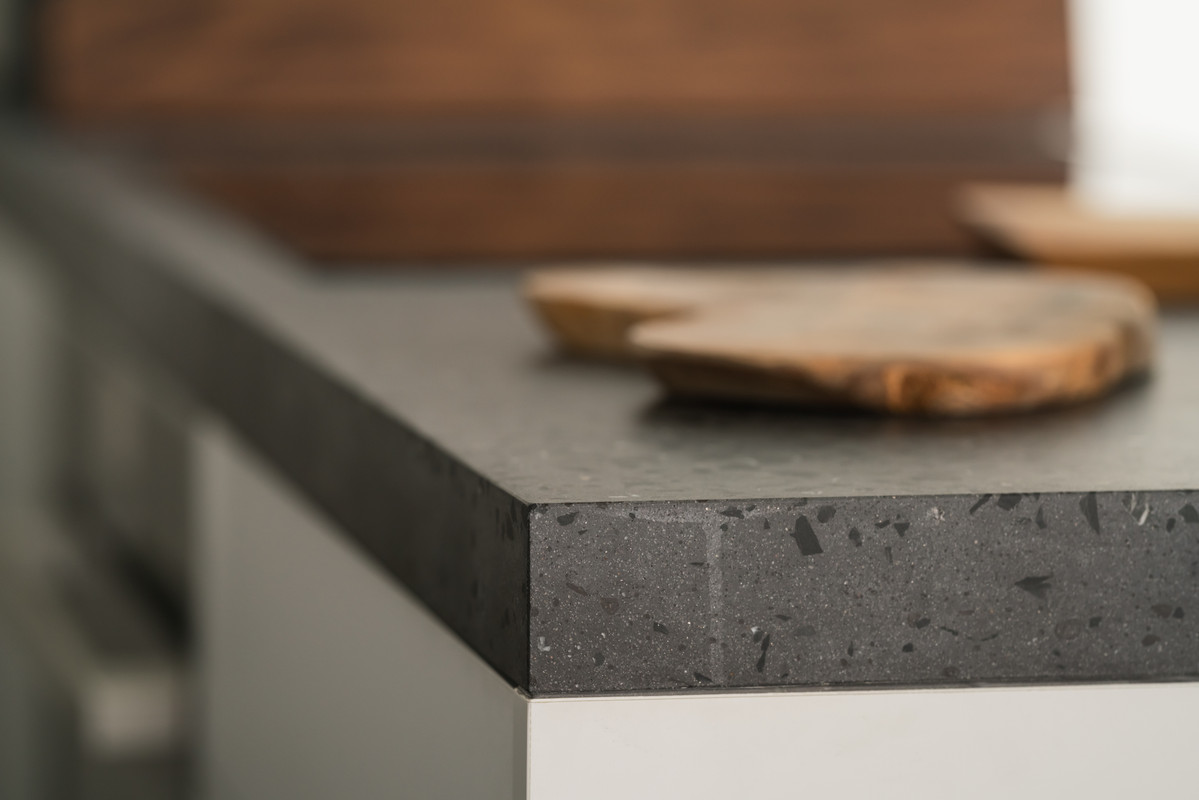How Do I Get Started With Concrete Countertops?
by siteadmin

If you're considering using concrete countertops for your home, you've probably asked yourself, "How do I get started?" You might be surprised to know that concrete is a versatile material. You can cut and shape the material to fit your space, whether you want a straight, L-shaped, or even C-shaped counter. You can also purchase pre-designed concrete counters, which will fit in perfectly with almost any room. And with the right materials and professional installation, they can be almost any shape.
Construction
Depending on the type of countertop you choose, you can create a thick, durable countertop that is easy to clean. You should choose a mix with high early strength for this project since it will facilitate faster processing, provide crack resistance, and minimize curling. This type of countertop requires casting in a mold and is usually made of concrete mixed with additives. After you've mixed and poured the concrete, the countertop needs to cure for about 10 days.
Concrete is an easy-to-use material that can be easily shaped into custom shapes, as well as colored and stained to match your decor. Unlike granite and marble counters, this material is completely weatherproof and durable. Even a do-it-yourselfer can create quality results with concrete countertops. In addition to their durability, concrete counters are remarkably low-maintenance and require minimal maintenance. Moreover, they are inexpensive to purchase, and you can build a concrete countertop anywhere in your home without hiring a professional.
Concrete is durable, but it's also porous, meaning that it can absorb stains and even bacterial growth. For this reason, it's important to seal your countertops before installing them. This will protect them from stains and scratches, but it will also make them resistant to heat and moisture. If you don't seal your countertops, they'll show water spots and marks from spills. This can be an eye sore and can look sloppy.
You can also use foam molds for a concrete countertop. The mold needs a support frame, which will prevent it from bending while the concrete cures. You can build this frame from 2x4s with an overhang of one-third of the mold's length. Then, place the countertop on top of the frame with the form facing up. When you're finished, you'll have a beautiful, durable countertop!
Finishes
If you're looking to update your kitchen countertops with a more polished look, you can choose from a variety of different finishes for concrete. The most popular types of concrete finishes are oil-based, sand-based, and polished. These types of finishes are also resistant to heat and scratches and should retain their luster over time. For more information on the various finishes available for concrete countertops, keep reading. This article will examine the various types of finishes available for concrete countertops and give you the best options available for your kitchen.
One of the most dramatic finishes for concrete countertops is an exposed aggregate finish. This type of finish begins by seeding decorative stones into the concrete mixture. Once the concrete hardens, these stones will create a gorgeous sheen and luster. You can also choose from various types of aggregate, such as recycled glass, decorative stone, seashells, and even broken tiles. This process will create a unique surface that's easy to clean and maintain.
A polished concrete surface is a great option if you want your countertops to look more like other materials. Polished concrete is a smooth surface that resembles stone. You can either have the surface smooth and mirror-like, or you can add additional elements to create a more unique design. One option for a polished concrete countertop is to trowel it, which will create unique textural effects. A low-luster finish can be achieved by hand sanding the surface.
The main disadvantage of a white concrete countertop is that it's very easy to stain it, so you should be extra careful about the finish that you choose. Damaged finishes can cause permanent staining and may even lead to the need to replace the concrete countertop. As a result, concrete countertops are generally pricier than most other countertop options. Expect to pay between $65-75 per square foot for a basic countertop and $135 for a custom-made one. The higher end of the range will cost more, but this is likely due to the skill required by a craftsman.
Care
Care of concrete countertops is as simple as wiping them down with a non-abrasive sponge and warm water. While these simple steps may seem like a lot, they can extend the life of your countertops while keeping them looking good. For best results, you should wipe up spills immediately. Although spills on concrete countertops are unlikely to cause damage, they can seep into the surface, especially if they were sealed several years ago. It is recommended that you avoid aggressive cleansers.
While concrete countertops are extremely durable, they can still crack. This is normal, but it can be unsightly. To prevent this, do not place hot objects on them. Use a thick mat to protect your countertops from heat. The reason why this is possible is that concrete shrinks when it cools, and this causes hairline cracks. You can also protect your concrete countertops from hot liquids by using a silicone or heat-resistant spray.
Cleaning concrete countertops is relatively easy. You can use mild soap and water to wipe them down, but be careful not to use abrasive cleaners, as these will damage the sealer. In addition, some contractors recommend reapplying wax to the concrete countertop surface every few months. Although the recommended maintenance will depend on the material, it will not compromise the quality of your countertop's durability. You should also follow manufacturers' recommendations to prevent stains.
Proper care of concrete countertops extends their life and is a great way to avoid costly repairs and replacements. Sealing your concrete countertops is an essential part of the long-term maintenance of these counters, and regular cleaning and re-sealing will keep them looking good for years to come. You can also avoid scratching them with abrasive objects like glass or plates. If you don't have time to reseal your concrete countertops, you can always hire someone to do the job for you.
Cost
When comparing countertop prices, concrete countertops are in the middle of the price spectrum. They cost more than tile, laminate, and synthetic solids, but less than marble, quartz, and granite counters. The following are some of the factors that can impact the cost of concrete countertops. Before deciding to install concrete countertops in your home, ask yourself the following questions. Which material do you want to use for your countertops? How much money are you willing to spend on concrete countertops?
Hand-troweled concrete countertops cost approximately $70 to $100 per square foot. The countertop will usually be smooth with a few rougher sections or hills. The more troweling the countertop has, the higher the cost per square foot. You may also want to install a backsplash to complete the look. But if you're willing to invest in the process, you can expect to pay between $60 and $150 per square foot for a concrete countertop.
When deciding on the design of your concrete countertops, consider the size and shape of your countertop. Large slabs may require 3 or 4 sets of hands, and they can add significantly to the cost. The additional cost of casting the extras, such as drainboards, trivets, and sinks, will also drive up the total cost. If you're unable to find a concrete countertop contractor in your area, you may have to travel a bit to get a good deal. Additionally, the cost of living in cities and on the coasts is higher than in smaller towns and cities.
Besides being cheap and easy to install, concrete countertops also require some experience. If you're handy with tools, you can pour a concrete countertop yourself. However, if you're not confident in your concrete-pouring skills, consider hiring a professional to do the job. It will save you a lot of time and ensure a quality finish. If you're not comfortable with working with concrete, consider hiring a professional to install your countertops.
Installation
If you have decided to install concrete countertops in your home, you need to know what to expect. The installation process is highly skilled and requires intensive labor. When choosing a contractor, ask for pictures or samples of their work. You should choose one that can incorporate your wishes and personalize your countertop according to your taste and requirements. Many countertop contractors work as a team, consulting interior designers and hiring their team of skilled workers to complete the project.
You should discuss with the client whether or not they want concrete countertops, as some people do not like the look. However, if you are the type of person who likes the rustic look of concrete, this is an option for you. While the cracks are purely aesthetic and do not affect the structure of the countertop, they are something to be aware of. Cracks may show up immediately after installation, or several weeks afterward. In either case, you should avoid cutting directly on the countertop, as it can ruin your knife and ruin the counter.
When it comes to a concrete countertop, the installation process is similar to that of installing stone. You can transport the concrete countertop slabs vertically. You can also use the same tools used to carry the stone. Once the concrete countertop has been placed, you should fill the seams using sanded acrylic tile caulk. Concrete countertops also require sealing under the sink opening. You can use a tutorial video to walk you through the installation process.
Once the countertop has been installed, you must apply a sealant to it to protect it. The sealant must cure for at least five days before it can be used again. You can also wax the surface to extend the time between resealing. Once the countertop is installed, you should apply a good wax sealer every nine to 12 months to maintain the beautiful finish. These sealants also prevent cracking and staining.
If you're considering using concrete countertops for your home, you've probably asked yourself, "How do I get started?" You might be surprised to know that concrete is a versatile material. You can cut and shape the material to fit your space, whether you want a straight, L-shaped, or even C-shaped counter. You can also purchase…
Recent Posts
- Roofing Company Savannah Sheds Light on the Lifespan of Roofs: How Long Should a Roof Last?
- Cost of Installing a Pool in Cape Coral, Florida: A Rough Guide
- Overland Park KS Painters Provides Insight: Essential Questions to Ask Your House Painter
- Is Stamped Concrete Cheaper than Regular Concrete? Debunking Myths with Columbus Stamp Concrete
- New Orleans Concreters Advocates for Stamped Concrete Driveways as the Ultimate Choice for Durability and Style
